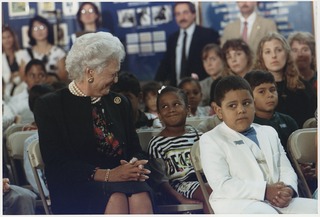Sources
- ↑ "How New Jersey's Standards are Sidelining Civics". 27 September 2017.
The New Jersey Core Curriculum Content Standards were created by the New Jersey State Board of Education in 1996 as the framework for education in New Jersey's public schools and clearly define what all students should know and be able to accomplish at the end of thirteen years of public education. Each subject is broken down for each of the grade levels. These subjects include visual and performing arts, comprehensive health and physical education, language arts literacy, mathematics, science, social studies, world languages, technological literacy, and career education and consumer, family, and life skills.
The standards are updated and revised as necessary every five years. In 2016, the Core Curriculum Content Standards were combined with a revised version of the Common Core State Standards and renamed the New Jersey Student Learning Standards. [1]
Educational essentialism is an educational philosophy whose adherents believe that children should learn the traditional basic subjects thoroughly. In this philosophical school of thought, the aim is to instill students with the "essentials" of academic knowledge, enacting a back-to-basics approach. Essentialism ensures that the accumulated wisdom of our civilization as taught in the traditional academic disciplines is passed on from teacher to student. Such disciplines might include Reading, Writing, Literature, Foreign Languages, History, Mathematics, Science, Art, and Music. Moreover, this traditional approach is meant to train the mind, promote reasoning, and ensure a common culture.

Phonics is a method for teaching people how to read and write an alphabetic language. It is done by demonstrating the relationship between the sounds of the spoken language (phonemes), and the letters or groups of letters (graphemes) or syllables of the written language. In English, this is also known as the Alphabetic principle or the Alphabetic code.

Diane Silvers Ravitch is a historian of education, an educational policy analyst, and a research professor at New York University's Steinhardt School of Culture, Education, and Human Development. Previously, she was a U.S. Assistant Secretary of Education. In 2010, she became "an activist on behalf of public schools". Her blog at DianeRavitch.net has received more than 36 million page views since she began blogging in 2012. Ravitch writes for the New York Review of Books.
Education in England is overseen by the United Kingdom's Department for Education. Local government authorities are responsible for implementing policy for public education and state-funded schools at a local level.

In education, a curriculum is broadly defined as the totality of student experiences that occur in the educational process. The term often refers specifically to a planned sequence of instruction, or to a view of the student's experiences in terms of the educator's or school's instructional goals. In a 2003 study, Reys, Reys, Lapan, Holliday, and Wasman refer to curriculum as a set of learning goals articulated across grades that outline the intended mathematics content and process goals at particular points in time throughout the K–12 school program. Curriculum may incorporate the planned interaction of pupils with instructional content, materials, resources, and processes for evaluating the attainment of educational objectives. Curriculum is split into several categories: the explicit, the implicit, the excluded, and the extracurricular.
The High School Proficiency Assessment was a standardized test that was administered by the New Jersey Department of Education to all New Jersey public high school students in March of their junior year until 2014-2015 when it was replaced by the PARCC. Together with the New Jersey Assessment of Skills and Knowledge, which was administered in grades 3-8, the HSPA was part of a battery of tests used to assess student performance in New Jersey's public schools.
The National Curriculum for England was first introduced by the Education Reform Act 1988. At the time of its introduction the legislation applied to both England and Wales. However, education later became a devolved matter for the Welsh government. The National Curriculum is a set of subjects and standards used by primary and secondary schools so children learn the same things. It covers what subjects are taught and the standards children should reach in each subject.

A Praxis test is one of a series of American teacher certification exams written and administered by the Educational Testing Service. Various Praxis tests are usually required before, during, and after teacher training courses in the U.S.

Eric Donald Hirsch Jr., usually cited as E. D. Hirsch, is an American educator, literary critic, and theorist of education. He is professor emeritus of education and humanities at the University of Virginia.
The New Jersey Assessment of Skills and Knowledge (NJASK) was a standardized test given to all New Jersey public-schooled students in grades 3-8 during (usually) March, April, or May, and was administered by the New Jersey Department of Education.

The New York State Education Department (NYSED) is the department of the New York state government responsible for the supervision for all public schools in New York and all standardized testing, as well as the production and administration of state tests and Regents Examinations. In addition, the State Education Department oversees higher education, cultural institutions such as museums and libraries, vocational rehabilitation, and the licensing of numerous professions. It is headed by the Board of Regents of the University of the State of New York (USNY) and administered by the Commissioner of Education.

The Middlesex County Academy for Science, Mathematics and Engineering Technologies is a four-year career academy and college preparatory magnet public high school located on the campus of the Middlesex County College in Edison, in Middlesex County, New Jersey, United States, serving students in ninth through twelfth grades as part of the Middlesex County Vocational and Technical Schools. The school serves students from all over Middlesex County who are eligible to apply to their program of choice while in eighth grade.
Education in the Philippines is provided by public and private schools, colleges, universities, and technical and vocational institutions in the country. Funding for public education comes from the national government. For the academic year 2017–2018, about 83% of K–12 students attended public schools and about 17% either attended private schools or were home-schooled.
Learning standards are elements of declarative, procedural, schematic, and strategic knowledge that, as a body, define the specific content of an educational program. Standards are usually composed of statements that express what a student knows.
County Prep High School is a full-time public magnet high school for students in ninth through twelfth grades, located in Jersey City in Hudson County, New Jersey, United States, operating as part of the Hudson County Schools of Technology.
The Pennsylvania System of School Assessment (PSSA) is a standardized test administered in public schools in the state of Pennsylvania. Students in grades 3-8 are assessed in English language arts skills and mathematics. Students in grades 4 and 8 are also assessed in skills relating to natural science, including the field of data interpretation and analysis. Since 2013, high school students have taken the Keystone Exam in place of the PSSA for their standardized testing. The PSSA's were made by a company in New Jersey. The PSSA is written, owned and administered by Pearson Education. There are reporting categories for each subject which list eligible content to be tested in each grade. Assessment Anchors specify what is considered eligible content for each grade level tested. A Proficient or Advanced level is needed to be able to qualify as passing the PSSA.

Literacy in the United States is 79% according to a 2019 report by the National Center for Educational Statistics. 21% of American adults are illiterate or functionally illiterate. According to the U.S. Department of Education, 54% of adults in the United States have literacy below the 6th-grade level.
Teaching writing in the United States has progressed through several approaches during the history of education in the United States. In schools, writing serves not only to record and convey thoughts, but to refine and synthesize thinking. As school effectiveness researcher Doug Reeves observes, "[t]he association between writing and performance in other academic disciplines [is] striking, and gets to the heart of the curriculum choices teachers must make."
The Common Core State Standards Initiative is an educational initiative from 2010 that details what K–12 students throughout the United States should know in English language arts and mathematics at the conclusion of each school grade. The initiative is sponsored by the National Governors Association and Council of Chief State School Officers.
Stonyhurst Southville International School is a learning institution in the province of Batangas and one of the SGEN schools.